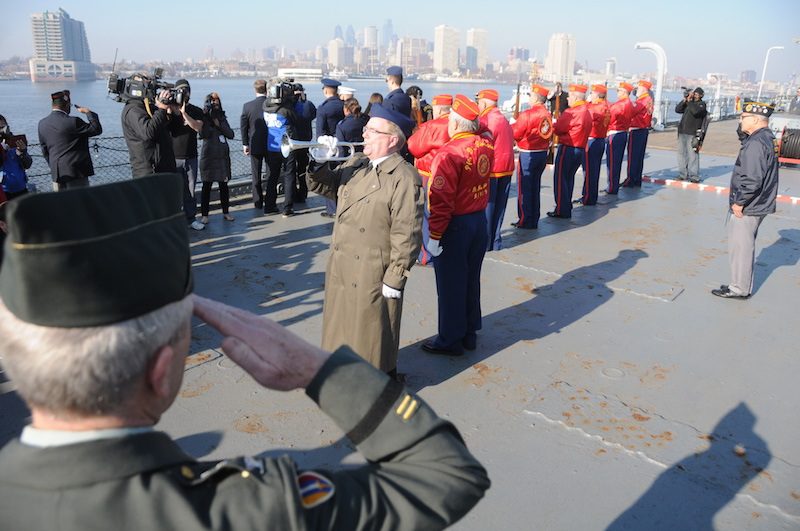When Greg Murphy’s father passed away, all the family wanted was a bugle player to perform “Taps” at the funeral. After all, the World War II veteran had played for thousands of military funerals. But the family soon learned that buglers were hard to come by, so Gloucester Township’s Murphy, 64, dusted off his old instrument and set out on a musical mission.
Do you ever get emotional playing at funerals, even though you’re supposed to remain professional and stoic when sounding Taps?
The mission is the mission – that’s the job. You kind of have to take yourself out of your body. It’s almost like when I get out of the car, Greg Murphy the person stays in the car, and Greg Murphy the bugler gets out of the car. You’ve got your job to do. You can’t be emotional. You have to sound those 24 notes and remain solemn for that time. There’s times when I’m standing there and I can feel some emotion coming up, but I have to remind myself there’s time for that later. Lots of times I’ll get back in the car and put the regular Greg Murphy back on, and the emotions swell up, like, that was rough. That was rough.
Do you take some of your work home with you then?
Yes, I take some things home, but to console myself, I always think about the service members and what they had to go through in an actual military situation. They probably lived through not just days, but months, of adverse conditions, and I’m just standing there, playing the horn. This is nothing. No one is shooting at me. There’s no roadside bombs. Yes, it can be rough and emotional, but the people who actually serve are the ones who have gone through the ordeal. I haven’t served myself, so this is how I can honor those who have.

Veteran’s Day ceremony at Veteran’s Island, Cooper River.
What kinds of services have you performed at over the years?
I’ve probably done more than 300 missions, which is what we call them. The first service I did was for a 9/11 ceremony to honor the first responders who had passed. Most of the missions are military funerals, but some are memorial services. On Memorial Day I go down to Ocean City and sound Taps before a moment of silence on the Boardwalk. I’ve sounded Taps at funerals with as few as three people, which is just as emotional as a larger service. And on the other end, I’ve sounded Taps at one service for an active duty fellow who was killed in Afghanistan. The entire county turned out. There was like 4,500 people there, just a huge outpouring of support and emotion for the family and service personnel.
Is it stressful? You have one shot to get it right, and everyone there probably knows what Taps sounds like.
It’s only 24 notes. I make sure I practice every day. I put in a half an hour practicing – I practice on the trumpet, on my scales. I play some songs, military marches and then I’ll play a couple takes of Taps. It does have to be spot-on, though. There’s no improvising, no changing it up. When you’re doing a military funeral, it’s those 24 notes. I do my best to make it sound perfect.
Why do you think people want a bugler playing live at military funerals?
There’s nothing like live music, whether it’s singing at church or bugling or organ playing. It’s a recognition of the person who gave their life, and while Taps is solemn, there’s a certain amount of uplifting when it’s played live. There’s a kind of life to it versus a recording. Nothing beats that connection, that personal input, that occurs when playing music live. When I’m out in a field or in the cemetery or a mausoleum, I can read the way the bugle will sound in those environments and really make the horn play the right way for the setting I’m in.
When did you first start playing an instrument?
I was originally a bass player in my high school, and then I picked up the trumpet, which is similar to the bugle. My father was also quite the trumpet player. At one point he had a 21-piece band called the Vincent Murphy Band. When he went into the service, he played Taps in the evening to tell people it was time to go to their bunks. After the war, he volunteered to play at services, and probably played over 1,000 funerals.
How did you get involved in performing at military funerals?
When my father passed away, I requested a bugler player from the Air Force base where he served, because he was a bugler himself. And they said, “You realize we have an extreme shortage of buglers, right? Nobody really plays that anymore.” So when we had the funeral, the honor guard did a wonderful job folding the flag, presenting it to my mother, and then turned around and hit the button on the boom box to play Taps. I shook my head and was like, “Well, dad, I guess you’re sending me a message.” I picked the horn back up again and starting practicing.
And how did you actually get to play at funerals?
About a year after my father’s funeral, I felt like I was good enough to start playing Taps at military funerals. Right around that same time, I read a story on the front page of “The Wall Street Journal” about Bugles Across America, an organization looking for volunteers to play Taps at military funerals. I called and said I wanted to be part of it.
Do the friends and families of the deceased ever say anything to you?
A lot of times, the families will come over and say thank you. And my only reply is, “It’s my honor.” Sometimes someone will even come over and comment about how good it is to hear Taps being played live.
What was the hardest service you’ve performed at?
The best man in my wedding, Tom, was also a trumpet player in the military band. Seven years ago, he was diagnosed with pancreatic cancer. When I was visiting him, I said, “Tom, you know I have to ask this – do you want me to play Taps at your funeral?” And he said, “Well, you can, but I don’t know if you have the chops.” I said, “I’ll do my best.” And I think I did.















